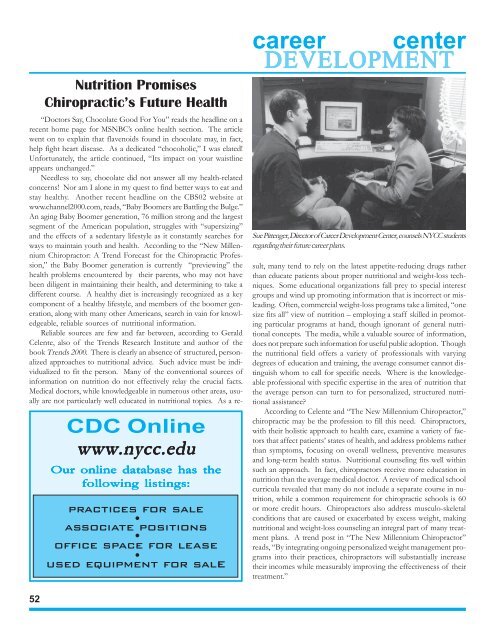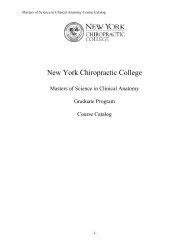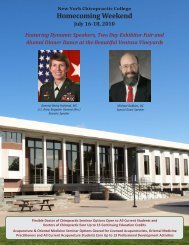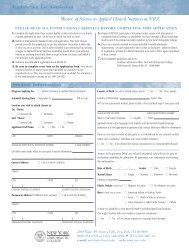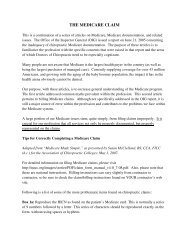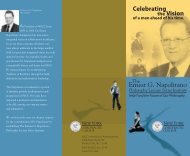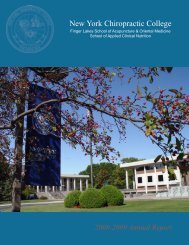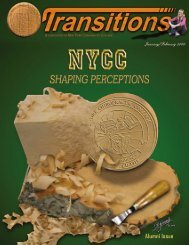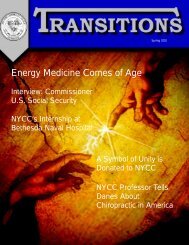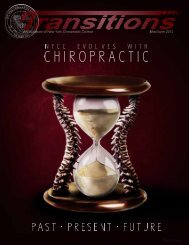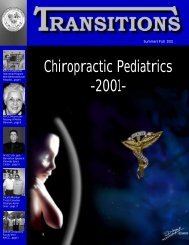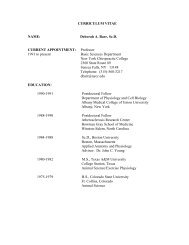2502 NYCC TRANS FINAL2 - New York Chiropractic College
2502 NYCC TRANS FINAL2 - New York Chiropractic College
2502 NYCC TRANS FINAL2 - New York Chiropractic College
You also want an ePaper? Increase the reach of your titles
YUMPU automatically turns print PDFs into web optimized ePapers that Google loves.
Nutrition Promises<br />
<strong>Chiropractic</strong>’s Future Health<br />
CDC Online<br />
www.nycc.edu<br />
Our online database has the<br />
following listings:<br />
practices for sale<br />
associate positions<br />
office space for lease<br />
used equipment for sale<br />
career center<br />
DEVELOPMENT<br />
Sue Pittenger, Director of Career Development Center, counsels <strong>NYCC</strong> students<br />
regarding their future career plans.<br />
“Doctors Say, Chocolate Good For You” reads the headline on a<br />
recent home page for MSNBC’s online health section. The article<br />
went on to explain that flavenoids found in chocolate may, in fact,<br />
help fight heart disease. As a dedicated “chocoholic,” I was elated!<br />
Unfortunately, the article continued, “Its impact on your waistline<br />
appears unchanged.”<br />
Needless to say, chocolate did not answer all my health-related<br />
concerns! Nor am I alone in my quest to find better ways to eat and<br />
stay healthy. Another recent headline on the CBS02 website at<br />
www.channel2000.com, reads, “Baby Boomers are Battling the Bulge.”<br />
An aging Baby Boomer generation, 76 million strong and the largest<br />
segment of the American population, struggles with “supersizing”<br />
and the effects of a sedentary lifestyle as it constantly searches for<br />
ways to maintain youth and health. According to the “<strong>New</strong> Millennium<br />
Chiropractor: A Trend Forecast for the <strong>Chiropractic</strong> Profession,”<br />
the Baby Boomer generation is currently “previewing” the<br />
health problems encountered by their parents, who may not have<br />
been diligent in maintaining their health, and determining to take a<br />
different course. A healthy diet is increasingly recognized as a key<br />
component of a healthy lifestyle, and members of the boomer generation,<br />
along with many other Americans, search in vain for knowledgeable,<br />
reliable sources of nutritional information.<br />
Reliable sources are few and far between, according to Gerald<br />
Celente, also of the Trends Research Institute and author of the<br />
book Trends 2000. There is clearly an absence of structured, personalized<br />
approaches to nutritional advice. Such advice must be individualized<br />
to fit the person. Many of the conventional sources of<br />
information on nutrition do not effectively relay the crucial facts.<br />
Medical doctors, while knowledgeable in numerous other areas, usually<br />
are not particularly well educated in nutritional topics. As a result,<br />
many tend to rely on the latest appetite-reducing drugs rather<br />
than educate patients about proper nutritional and weight-loss techniques.<br />
Some educational organizations fall prey to special interest<br />
groups and wind up promoting information that is incorrect or misleading.<br />
Often, commercial weight-loss programs take a limited, “one<br />
size fits all” view of nutrition – employing a staff skilled in promoting<br />
particular programs at hand, though ignorant of general nutritional<br />
concepts. The media, while a valuable source of information,<br />
does not prepare such information for useful public adoption. Though<br />
the nutritional field offers a variety of professionals with varying<br />
degrees of education and training, the average consumer cannot distinguish<br />
whom to call for specific needs. Where is the knowledgeable<br />
professional with specific expertise in the area of nutrition that<br />
the average person can turn to for personalized, structured nutritional<br />
assistance?<br />
According to Celente and “The <strong>New</strong> Millennium Chiropractor,”<br />
chiropractic may be the profession to fill this need. Chiropractors,<br />
with their holistic approach to health care, examine a variety of factors<br />
that affect patients’ states of health, and address problems rather<br />
than symptoms, focusing on overall wellness, preventive measures<br />
and long-term health status. Nutritional counseling fits well within<br />
such an approach. In fact, chiropractors receive more education in<br />
nutrition than the average medical doctor. A review of medical school<br />
curricula revealed that many do not include a separate course in nutrition,<br />
while a common requirement for chiropractic schools is 60<br />
or more credit hours. Chiropractors also address musculo-skeletal<br />
conditions that are caused or exacerbated by excess weight, making<br />
nutritional and weight-loss counseling an integral part of many treatment<br />
plans. A trend post in “The <strong>New</strong> Millennium Chiropractor”<br />
reads, “By integrating ongoing personalized weight management programs<br />
into their practices, chiropractors will substantially increase<br />
their incomes while measurably improving the effectiveness of their<br />
treatment.”<br />
52


